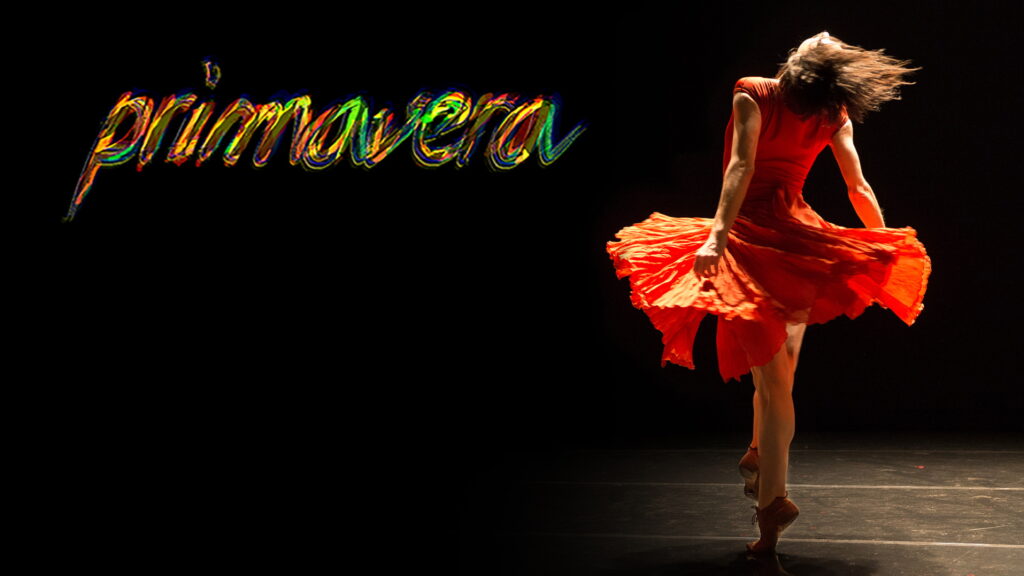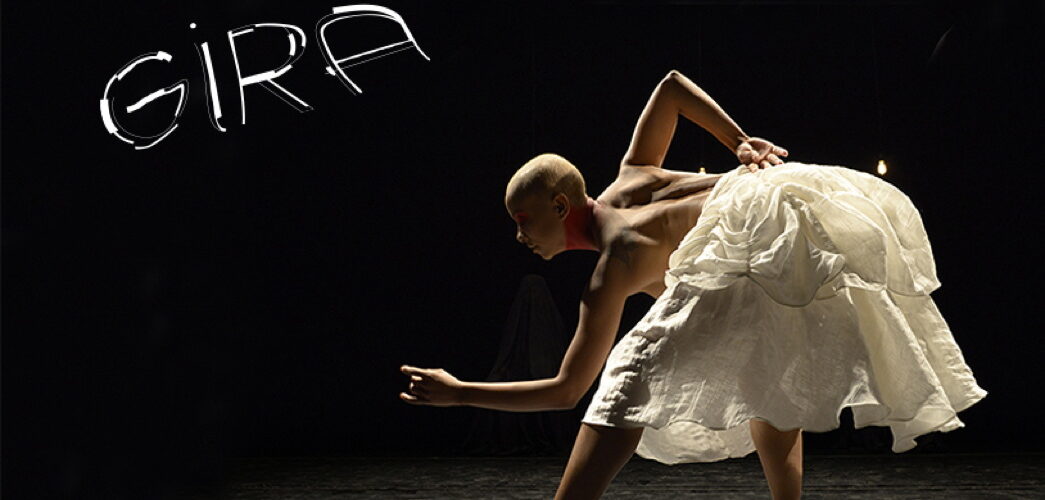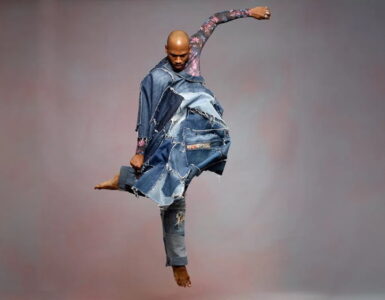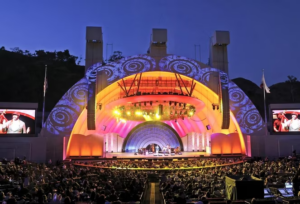
Get ready for an electrifying, unforgettable experience as one of Brazil’s most celebrated contemporary dance companies, Grupo Corpo, takes the stage at The Music Center’s Ahmanson Theatre for three stunning performances this spring. From May 2–4, 2025, this dazzling company will bring the vibrant, soul-stirring rhythms and energy of Brazil to Los Angeles in a spectacular celebration of movement, music, and culture. Get your tickets now by visiting musiccenter.org/grupocorpo or by calling (213) 972-0711.
Above photo is from their European tour March 2023, premiere of “Primavera.”
Founded in 1975 by artistic director Paulo Pederneiras and choreographer Rodrigo Pederneiras, Grupo Corpo (meaning “Body Group” in Portuguese) is renowned for its unparalleled blend of popular Brazilian culture, African rhythms and classical technique.
As part of the 2024/2025 Glorya Kaufman Presents Dance at The Music Center season, Grupo Corpo is making its long-awaited return to L.A. for the first time since 2011, and trust me—this is a performance you won’t want to miss. Prepare to be swept away by 21 and Gira, two electrifying works that fuse classical ballet with Brazilian folk traditions and cutting-edge choreography.
In 21 (from 1992), choreographer Rodrigo Pederneiras takes you on a thrilling ride through a rhythmic world of movement, mathematics, and music. With 22 dancers weaving intricate patterns around the number 21, this 40-minute ballet is a hypnotic blend of Brazilian folk energy and classical ballet’s grace. Set to a captivating score by Marco Antônio Guimarães, the piece builds to an unforgettable finale—bursting with vibrant color and cultural celebration.

On the other hand, Gira (2017) delves deep into the spiritual, mesmerizing world of Afro-Brazilian religious rituals. Pederneiras’ choreography channels the raw, ritualistic energy of Umbanda and Candomblé ceremonies, creating a primal, trance-like experience on stage. With original music by Metá Metá, this powerful 40-minute performance pulses with intensity, transporting the audience into the heart of Brazil’s sacred traditions.
“We’re beyond excited to bring Grupo Corpo back to Los Angeles after so many years. This company is a stunning reflection of Brazil’s rich cultural tapestry, and their performances are always a transformative experience. Don’t miss this rare chance to see a world-class company that blends breathtaking movement with unforgettable rhythms!”
Rachel S. Moore, President and CEO of The Music Center.
Founded in 1975 by Paulo Pederneiras, Grupo Corpo has earned international acclaim for its unique ability to merge Brazilian folk traditions with classical techniques. With more than 40 works to their name, they’ve captivated audiences around the world, from Iceland to Singapore, and now, they’re bringing their vibrant energy back to L.A.
“We’ve been dreaming of returning to Los Angeles for so long. We can’t wait to share the passion and intensity of 21 and Gira with this incredible audience. It’s going to be a celebration of energy, emotion, and the beautiful spirit of Brazil.”
Artistic Director Paulo Pederneiras.
Don’t miss your chance to experience the magic of Grupo Corpo in Los Angeles! Get your tickets now by visiting musiccenter.org/grupocorpo or by calling (213) 972-0711. The show promises to deliver an extraordinary journey into the heart of Brazil’s culture, through the powerful language of dance.

GRUPO CORPO
The Music Center’s Ahmanson Theatre
Friday, May 2, 2025, 7:30 p.m.
Saturday, May 3, 2025, 7:30 p.m.
Sunday, May 4, 2025, 2:00 p.m.
21 (1992)
Choreography: Rodrigo Pederneiras
Music: Marco Antônio Guimarães / UAKTI
Set Design: Fernando Velloso
Costume Design: Freusa Zechmeister
Lighting: Paulo Pederneiras
Gira (2017)
Choreography: Rodrigo Pederneiras
Music: Metá Metá
Set Design: Paulo Pederneiras
Costume Design: Freusa Zechmeister
Lighting Design: Paulo Pederneiras and Gabriel Pederneiras
In 21, dancers weave rhythmic and timbral combinations around the number 21. Audiences will be delighted by the musical score’s unique sounds emanating from composer Marco Antonio Guimarães’ unusual instrumental creations. In Gira, Rodrigo Pederneiras constructs a powerful glossary of gestures of praise and trance-like turning and movement inspired by Afro-Brazilian religious rituals and set to 11 musical themes that were created especially for the company by the Brazilian fusion group Metá Metá.
From the press release:
ABOUT GLORYA KAUFMAN PRESENTS DANCE AT THE MUSIC CENTER:
Glorya Kaufman Presents Dance at The Music Center, a TMC Arts program, is one of the leading presenters of dance on the West Coast. The celebrated series offers significant works by prestigious ballet and contemporary dance artists from around the world. Now in its 22ndyear, Glorya Kaufman Presents Dance at The Music Center is a powerful force, bringing works by today’s most influential companies and choreographers to audiences in Los Angeles. Performances are complemented by special experiences for both ticket buyers and the public with opportunities to learn more about the choreography and the themes explored, including panels, master classes, dance film festivals, interactive experiences and more. The 22nd season of Glorya Kaufman Presents Dance at The Music Center is generously supported by Glorya Kaufman Foundation, Center Dance Arts, Dorothy B. Chandler Program Fund and Elisabeth Katte Harris.
ABOUT CENTER DANCE ARTS:
Center Dance Arts is a dynamic community of patrons with a passion for dance. Center Dance Arts members bring dance to life in Los Angeles by promoting The Music Center’s world-class dance performances, extensive educational outreach and free and low-cost community experiences so all may experience the transformative power of dance. For more information, visit musiccenter.org/cda.
ABOUT THE MUSIC CENTER:
The Music Center convenes artists, communities and ideas with the goal of deepening the cultural lives of every resident in Los Angeles County. The $80 million non-profit performing arts organization has two divisions: TMC Arts and TMC Ops. TMC Arts, The Music Center’s programming engine, provides year-round programming inside The Music Center’s four theatres, on Jerry Moss Plaza, outside at Gloria Molina Grand Park—a 12-acre adjacent green space—in schools and other locations all over Los Angeles County. TMC Arts presents world-class dance with Glorya Kaufman Presents Dance at The Music Center, free and low-cost public concerts and events, live and digital K–12 arts education programs, workshops, performances, interactive experiences and special events. TMC Ops manages the theatres, the Plaza and Gloria Molina Grand Park, which comprise $3 billion in county assets, on behalf of the County of Los Angeles. The Music Center is also home to four renowned resident companies—Center Theatre Group, Los Angeles Master Chorale, LA Opera and LA Phil. For more information, visit musiccenter.org. Follow The Music Center on social media @MusicCenterLA.
ABOUT GRUPO CORPO:
The contemporary Brazilian dance company Grupo Corpo, founded by Paulo Pederneiras in 1975, in Belo Horizonte, State of Minas Gerais, Brazil, debuted its first work, Maria Maria, the very next year. Featuring original music by Milton Nascimento, a script by Fernando Brandt and choreography by the Argentine Oscar Araiz, the ballet would go on to spend ten years on stage and tour 14 countries. But even though the piece was an immediate critical, popular and commercial success, the group’s distinctive artistic identity, its long-term popularity and its artistic achievements have been the fruits of a long, arduous journey. As a result, the group started operating in its own premises as of 1978.
While the success of Maria Maria was still reverberating throughout Brazil and in various European and Latin American countries, Grupo Corpo (literally “body group” in English) never stopped working, staging no less than six productions between 1976 and 1982. In the first phase of the group’s existence, the influence of Araiz, who in 1980 would write O Último Trem, was evident in varying degrees in the dance troupe’s work. However, the company’s distinctive features and personality were chiefly shaped by Paulo Pederneiras, the man responsible for sets and lighting the group’s performances and its artistic direction and the dancer Rodrigo Pederneiras, who left the stage in 1981 to assume the role of full-time choreographer.
In 1985, the company launched what would be its second great success: Preludes, a theatrical piece incorporating 24 Chopin preludes performed by pianist Nelson Freire. The show debuted to public and critical acclaim at the First International Dance Festival of Rio de Janeiro and would cement the group’s reputation in the world of contemporary Brazilian dance.
Grupo Corpo then entered a new phase, establishing its own unique theatrical language and choreography. Starting with an erudite repertoire featuring the works of Richard Strauss, Heitor Villa-Lobos and Edward Elgar, among others, the company began combining classical technique with a contemporary re-reading of popular Brazilian dance forms. This would become the group’s trademark.
In 1989 the company debuted Missa do Orfanato , a complex theatrical reading of Mozart’s Missa Solemnis k.139. Almost operatic in dimensions, this ballet became such an aesthetic triumph that, nearly two decades later, it remains in the company’s repertoire.
The group underwent a radical transformation three years later with the production of 21, a ballet which confirmed the uniqueness of Rodrigo Pederneiras’s choreography and the unmistakable persona of the dance troupe. Utilizing the singular sounds of Brazilian instrumental group Uakti, as well as 10 themes composed by Marco Antônio Guimarães, 21 leaves behind the group’s concern with technical form and sees it taking apart melodies and rhythms in order to explore their underlying ideas. The decision to once again use specifically composed scores – a mark of the group’s first three shows in the 1970s – allowed it to further explore the language of popular Brazilian dance.
In the work that followed, Nazareth (1993), Rodrigo Pederneiras’s fascination with traversing the worlds of both popular and erudite music found a perfect opportunity for fuller expression. Inspired by the verbal games of Brazilian literary icon Machado de Assis (1839-1908) and by the works of Ernesto Nazareth (1863-1934), a seminal figure in the formation of Brazilian popular music, the work was scored by composer and literary theorist José Miguel Wisnik. Though built on a solid, classical foundation, the production brought together in good-humored fashion the lighthearted and sensual elements inherent Brazilian popular dances.
The partnership of Grupo Corpo with contemporary authors has been such a success that scores composed especially for the company have become the norm, and each score has inspired a new creation. An exception came in 2004 with the production of Lecuona, a work that drew on 13 love songs by the Cuban composer Ernesto Lecuona (1895-1963) and in which Rodrigo Pederneiras demonstrated his gift for the creation of pas-de-deux.
Beginning in the mid-1990s, Grupo Corpo intensified its international touring. Between 1996 and 1999, it was the resident dance company of the Maison de la Danse in Lyon, France. Several of the group’s creations (Bach, Parabelo and Benguelê ) were first staged in Europe during this period.
Today, having created more than 40 choreographies, the Brazilian dance company gives performances in places as distinctive as Iceland and South Korea, the United States and Lebanon, Italy and Singapore, the Netherlands and Israel, France and Japan, Canada and Mexico.
The minimalism of Philip Glass, the vigorous pop and urban sounds of Arnaldo Antunes, the primordial experimentalism of Tom Zé, the African sensibility of João Bosco, the metaphysical verse of Luís de Camões and Gregório de Mattos with the light touch of Caetano Veloso and Wisnik, the rootsy modernity of Lenine, the sound diversity of Moreno, Domenico and Kassin, the contemporary vision of Martin Codax’s medieval songs by Carlos Núñez and José Miguel Wisnik, the pop style of Samuel Rosa, and the musical genius of Gilberto Gil, Grupo Corpo has drawn on all of these elements and more to produce shows of a very diverse character – cerebral, cosmopolitan, primitive, existential, tough – while always keeping in sight the company’s distinctive traits.








Add comment